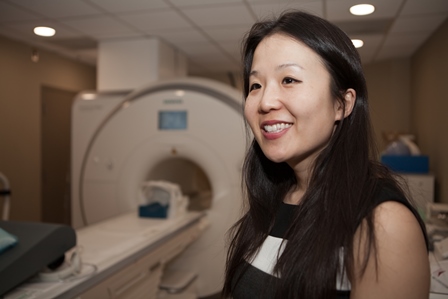Neurologist Dr. Jiwon Oh is using advanced imaging techniques to find differences between patients with #multiple sclerosis. She hopes those differences will serve as biomarkers that help personalize treatment for each patient.
Tailoring treatment to each patient is the backbone of good health care. And for patients with multiple sclerosis, Dr. Jiwon Oh thinks the key to finding that backbone is in the spinal cord.
MS affects nearly 100,000 Canadians, making it the most common disabling neurological disorder of young adults in the country. The condition is caused by the immune system attacking the insulating covers of nerve cells in the brain and spinal cord. The insulated covers, called myelin sheaths, transmit impulses from the brain and spinal cord.
MORE: UNRAVELLING THE MYSTERY OF LYME DISEASE
“My research looks at the damage MS causes to spinal cord tissue,” says Dr. Oh, a neurologist with the MS Clinic of St. Michael’s Hospital. “I’m hoping to find biomarkers that will help clinicians monitor and more accurately predict how patients will do decades down the road.”
Dr. Oh is one of the only researchers in the world using multiple advanced imaging techniques to look at the impact of MS on spinal cord tissue. Each of these techniques –including diffusion tensor imaging, magnetization transfer imaging and functional MRI– allow her to look at specific tissues in vivid detail.
“The standard of care for MS is to begin by treating all patients with milder drugs and adjust treatment if symptoms progress, but we could do more for our patients if we had some way to decide who will have very bad MS and give those individuals stronger treatment from the beginning,” says Dr. Oh.
Some of the more potent MS treatments have serious side effects, such as brain infections or auto-immune disorders of the blood. Those risks are serious enough that specialists avoid using stronger drugs for all MS patients.
The St. Michael’s Multiple Sclerosis Clinic team is comprised of:
- five full-time MS neurology specialists
- three part-time MS neurology specialists
- one full-time nurse
- one part-time nurse
- another full-time nurse will join the team soon
MORE: HELPING KIDS REACH THEIR FULLEST POTENTIAL
Dr. Oh says the benefits of aggressively treating MS for patients with severe symptoms are worth the risks. But if the spinal cord holds the biomarker key to MS severity, Dr. Oh and her research team will help specialists personalize treatment and reduce risk for each patient with the disease.
St. Michael’s is home to Canada’s largest MS clinic and one of the busiest in North America. The clinic has a roster of more than 7,000 patients, many of whom are part of clinical trials and research studies.
The clinic recently received funding from the Ministry of Health and Long-Term Care for an additional full-time nurse, which will allow the clinic to care for the growing number of patients followed in the MS Clinic.




